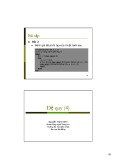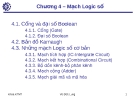
Coping with Errors
It's a fact of life that bad things sometimes happen. Tires get punctured, batteries run
down, screwdrivers are never where you left them, and users of your applications behave
in an unpredictable manner. Errors can occur at almost any stage when a program runs,
so how do you detect them and attempt to recover? Over the years, a number of
mechanisms have evolved. A typical approach adopted by older systems such as Unix
involved arranging for the operating system to set a special global variable whenever a
method failed. Then, after each call to a method, you checked the global variable to see
whether the method failed. This solution has a number of shortcomings:
• The main program logic becomes intertwined with alternating code to check and
handle the errors. The program quickly becomes hard to understand.
• The error checking and handling code is typically very repetitive and can easily
double the size of the program. A large program is harder to understand than a
small program simply because it's larger. Duplicate code is always a warning sign
that an application can be structured in a better manner.
• The error codes used by a global variable, such as –1 used by Unix systems, are
not inherently meaningful. What does –1 mean? Integer error codes don't describe
the errors they represent. They're very programmatic. Once again, the program
becomes harder to understand and maintain.
• It's just too easy to ignore the error condition and assume that a method being
called works every time. Many programmers don't like to read documentation, and
fewer like to write it, so the method might not be documented with information
about the errors it can cause.
For these reasons, C# and most other modern object-oriented languages don't handle
errors in this way. It's just too painful. They use exceptions instead. If you want to write
robust C# programs, you need to know about exceptions.













![Câu hỏi trắc nghiệm Lập trình C [mới nhất]](https://cdn.tailieu.vn/images/document/thumbnail/2025/20251012/quangle7706@gmail.com/135x160/91191760326106.jpg)












